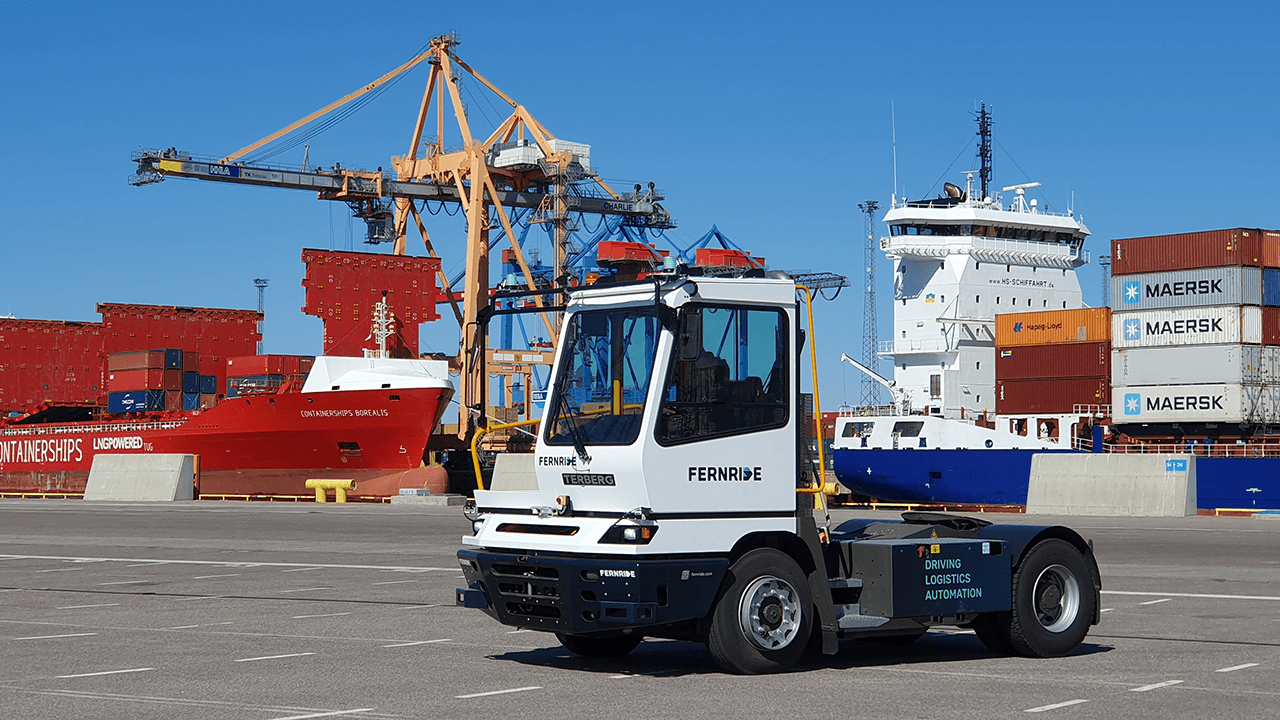Today German autonomous electric trucking innovator Fernride announced a $19 million increase to its Series A funding, bringing the total round amount to $50 million.
Fernride provides scalable automation solutions for yard trucking with a human-assisted technology, allowing remote-controlled operations.
This offers a practical response to major industry challenges, such as the negative environmental impact of diesel logistics operations.
I spoke to Hendrik Kramer, co-founder and CEO of Fernride, before the announcement to find out more.
Yard trucks operate on private sites, moving cargo from A to B, such as moving containers between two halls on-site at a one to two-kilometre distance 100 times a day.
Automation not only eliminates the requirement for human drivers but also enhances on-site safety. It improves vehicle efficiency by eliminating expensive idling periods while trucks are being loaded, thanks to the seamless switching capabilities of teleoperators who can maximise productivity by managing multiple vehicles.
And it solves another pressing problem — driver shortages.
Automation solves driver shortages
Truck drivers are in short supply. Realistically, automation is the only solution. Even in the US, Walmart began offering driver salaries of up to $110,000 a year but is still unable to meet the demand for drivers.
Research by IRU last year found there are 380,000-425,000 unfilled truck driver positions in Europe. The demand for drivers increased by 44 percent between January and September 2022 — with no signs of these positions being successfully filled.
Further, not enough drivers join the profession every year to replace those who retire. If the situation continues, around half of total truck driver positions will be vacant in 2026, on average, among the countries studied. Such a high shortage will have major short-term consequences for the entire logistics industry and the economy.
Autonomous trucks have a huge role to play in both middle-mile and long-distance trucking, especially with predictable routes such as from the market or shipyard to the loading bay.
Self-driving trucks can drive long distances without the need for breaks or drivers. They drive predictably, which reduces wear and tear, leading to fewer breakdowns and diminished repair expenses.
However, commercial vehicle automation has long been challenged by regulation delays, costly R&D, and the challenge of running out of funds before actually bringing commercial solutions to market.
Kramer explained the funding will be used to "double down on building the category leader in autonomous electric trucking"
"We have a very sound plan with a step-by-step approach. launching our product first in yards, scaling it there, and then in the future we roll out into open roads."

This incremental approach is what really makes Fernride stand out. Driverless operations gain their resilience and viability by operating on private land, "unlocking the benefits and reliable service of driverless operations for their customers from day one".
This approach has already won the company partnerships with industry players such as Volkswagen, DB Schenker, and HHLA.
And the investment is a huge opportunity to scale Fernride's viability across various use cases.
In June, HHLA TK Estonia, a subsidiary of Hamburger Hafen und Logistik AG (HHLA), and Fernride completed the first phase of a joint project at the Estonian terminal, successfully integrating automated container handling into HHLA TK Estonia's work processes.
Estonia is a country known for a digital-first approach to innovation. Kramer explained that HHLA always tests its tech in Estonia "since they want to move fast at a rapid pace. "
"They don't start immediately in the largest terminal, but lead processes where you can innovate quickly, then scale it to the other terminals and other sites."
New investors bring strategic advantages
Fernride's new investors include Germany's Deep Tech and Climate Fonds (DTCF), a $ billion venture fund financed via Germany's "Future Fonds" and the ERP special fund created to drive the growth of deep tech and climate companies in Germany and Europe, alongside San Francisco-based Munich Re Ventures, Bayern Kapital, and Klaus Kleinfeld, who also assumes the key role of Chairman on Fernride's board.
Kramer explained that the new investment had a lot of strategic advantages.
"There are some new questions that come up when you also want to innovate on the insurance side, and we now have the venture arm of Munich Re, the world's largest reinsurance company, and a leading global provider of primary insurance and insurance-related risk on board.
We also benefit from funders with close links to government, which is very helpful when you want to regulate autonomous vehicles down the road. Klaus Kleinfeld brings a global perspective to our board."
These investors add to the strong roster of existing venture capital support from 10x Founders, Promus Ventures, Fly Ventures, Speedinvest, and Push Ventures, along with corporate investors HHLA Next, DB Schenker via Schenker Ventures, and Krone.
"As CEO this is super positive momentum for us for our next growth stage."
The company has over 130 employees working in offices located in Munich and Wolfsburg.
Dr. Elisabeth Schrey of DTCF adds to the news:
"Fernride has assembled an exceptional team within the industry and has the potential to develop into a leading global technology champion from Germany.
Fernride's pioneering technologies that automate and decarbonize the supply chain fits well into the Deep Tech and Climate Fonds investment focus."
"By starting with teleoperations that initially keeps a human in the loop, we believe Fernride's step-by-step approach is the optimal path towards building fully autonomous capabilities," shared Timur Davis, Director at Munich Re Ventures.
"Fernride has already demonstrated its ability to partner with key players in the industry and is positioned to rapidly build on its unique strengths and capabilities to succeed where others in the market have fallen short."
Kramer admits modestly that the company is in a good position with a wide customer base but also so much interest that "we cannot work with everybody that wants to work with us."
And in a time where many startups and scale-ups are struggling commercially, that's a very good problem to have.
Lead image: via Fernride. Photo: Uncredited.



Would you like to write the first comment?
Login to post comments